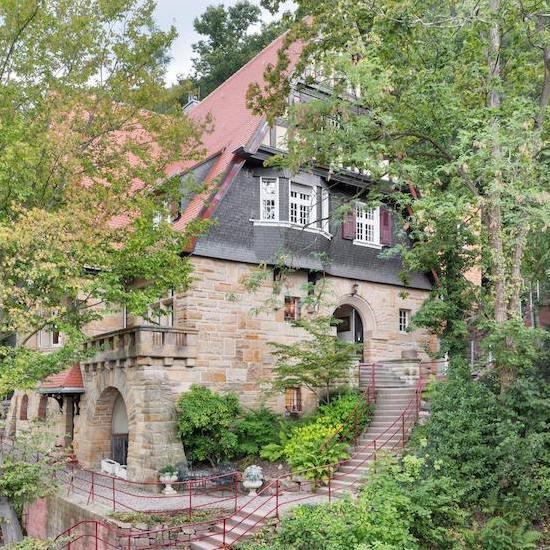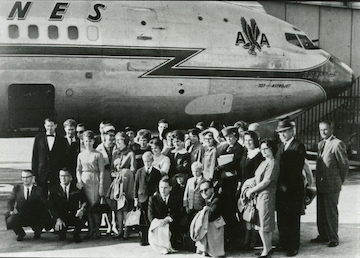Pepperdine Celebrates 60th Anniversary of Heidelberg International Campus

This year marks the 60th anniversary of Pepperdine’s International Programs, originally known as the Year-in-Europe program, which began in the fall of 1963 with the University’s inaugural study-abroad program in Heidelberg, in what was then West Germany. Home to Germany’s oldest university, the University of Heidelberg (founded in 1386), Heidelberg is an education-oriented city, with approximately one-quarter of its 160,000 residents being students.
“What a testimony to peace between nations that Pepperdine University chose to place its first international program in the oldest university town of a country with which it had been at war only some years earlier,” says Daniel Daugherty, who has been the director of the Heidelberg program since 1993 and teaches German literature there.
 A group of 36 students gather on the tarmac to depart for
A group of 36 students gather on the tarmac to depart for
Heidelberg as part of Pepperdine College’s first Year-in-Europe
program, joined by Pepperdine administrators Howard A. White
and J. C. Moore, Jr., on September 5, 1963.
Initially conducting classes and housing students in various hotels and guest houses throughout the city, Pepperdine acquired a permanent home for the Heidelberg program in 1965 in the form of a turn-of-the-century villa (pictured above) which was purchased for $100,000, the equivalent of approximately $950,000 today. The villa, built in 1906, is located at the top of “Castle Hill,” just 300 yards from Heidelberg Castle, which dates back to the early 1200s. In 1966 the villa was named Moore Haus to honor J. C. Moore, Jr., who served Pepperdine from 1958 to 1969, first as controller and then as vice president for planning, and was a founder of the University’s Heidelberg international program.
Moore Haus, a four-story mansion, features a library, a reception room, a computer lab, a student kitchen, a student center, student rooms, and an apartment for the faculty in residence, as well as administrative offices. A new wing, the Tower Annex, was added to the original building in 1980. Pepperdine completely renovated Moore Haus during the summers of 2014 and 2015 while maintaining the traditional look of the historic building. A student-guided video tour of Moore Haus, filmed in the fall of 2022, is available on the Pepperdine International Programs YouTube channel.
Classes are held in the central Altstadt (“Old Town”) district of Heidelberg in a building on the Hauptstrasse (“Main Street”), a mile-long pedestrian thoroughfare lined with shops and restaurants. “For me, one of the most life-changing aspects of participating in the Heidelberg program was the daily walks between Moore Haus and the classrooms on the Hauptstrasse,” says Ronald R. Cox, dean of International Programs and professor of religion, who served as faculty in residence for the Heidelberg program for the 2016–2017 academic year. “Every step deepens your connection to the city’s history, to its people, to its environment. One’s life is intermingled with the beauty of Heidelberg.”
In addition to the opportunity to study the German language at beginner, intermediate, and advanced levels in an immersive environment, Pepperdine students have a choice of general education courses in a number of subjects, including religion, humanities, and art.
“The Heidelberg program contributes to a better understanding of the world for our students and teaches them to view their environment through the eyes of others, such as their German language partners and the children with whom our students work in the after-school service project, Kinderreich,” Daugherty says. “It gives them the opportunity to better understand the world through daily foreign-language acquisition and to discover the great European historical sites and works of art firsthand through their travels while abroad.”
Beverley Smith Royster (’65), a program alumna from the 1965–1966 academic year who is now a retired educator, recalls numerous special memories from her Heidelberg experience, including time spent with members of the community. “I participated in the local Church of Christ,” she says. “A few of us students would hang around after church services, hoping one of the locals would invite us to their house for a meal, and they usually did.”
Royster also took advantage of the opportunity to discover the great cities of Europe while studying in Heidelberg. “I led a student trip to Venice, Florence, and Rome, including a visit to the Vatican to witness blessings from the Pope,” she says. “I went to East Berlin with several other Pepperdine students, and we met a German student there who gave us a tour of the city and took us to the ballet.”
Germany’s geographical location as a convenient base from which to visit other parts of Europe continues to be a major draw of the Heidelberg program. “Because Germany is so central, it presents a unique opportunity to explore different cultures,” says Caroline Decker (’22), a 2019–2020 Heidelberg program alumna who now manages marketing and event coordination as an office specialist for International Programs.
“One of my most memorable experiences in Heidelberg was our Thanksgiving celebration,” Decker recalls. “For most of us, it was our first Thanksgiving away from our families, but we squeezed into the kitchen and whipped up our favorite meals from home. Then, like the Americans we are, we headed to the castle grounds for a football game. After only a few minutes, local Germans in the park started gathering around to watch us play American football. They were all laughing with us and cheering us on. We took what could have been a sad, rainy day and turned it into one of our favorite memories.”
June Hagen (’76, MA ’79), a vocational consultant, studied in Heidelberg during the 1975–1976 academic year. “I have many stand-out memories from those eight months,” she says. “One is getting tickets to the 1976 Winter Olympics in Innsbruck, Austria, and a group of us piling onto a train to get there. I still say that Heidelberg was the best year of my life and the best education I could ever have.”
Beyond their time abroad, many Heidelberg alumni carry their academic and experiential learning with them throughout their lives and continue the tradition of Pepperdine’s transformative international experiences as they influence future generations of Waves. “Some children of Heidelberg alumni have themselves become Heidelberg students, and the torch is thus passed to a new generation,” says Daugherty. “It amazes me that children of students who came to Heidelberg in my first year (1993–1994) were students in the Heidelberg program in my 30th year (2022–2023).”
Having grown substantially over the past 60 years, International Programs now offers year-long educational opportunities in London, England (established in 1984); Florence, Italy (established in 1985); Buenos Aires, Argentina (established in 2000); and Lausanne, Switzerland (established in 2007). Beginning in the fall of 2023, the Swiss study-abroad program will move from Lausanne to the Château d’Hauteville, a fully renovated 18th-century estate located in the hills above Vevey, overlooking Lake Geneva. In response to the COVID-19 pandemic and a larger-than-average incoming freshman class, International Programs offered a special one-time-only program in Barcelona, Spain, for the 2022–2023 academic year. International Programs also oversees a year-long program in Washington, DC, that features global internships and international study tours.
“When alumni talk about their stay abroad, they describe how magical the experience was and how it expanded their horizons emotionally, professionally, and even spiritually,” says Karin Shaw, vice chancellor of global engagement and development. “Once you have experienced firsthand that living abroad is within reach and enriching, it empowers you to make bolder decisions in every area of your life. Participation in a study-abroad program is a starting point for a lifelong journey toward global citizenship.”
Unlike most university study-abroad programs, which place students in an international setting for just one semester, all of Pepperdine’s permanent study-abroad opportunities allow students to immerse themselves in a foreign culture for a full academic year.
“Students participating in Pepperdine’s international programs become more aware of the world, more aware of others, and more aware of themselves,” says Cox. “Students become both more confident and more caring. Indeed, they become more themselves—who God created them to be.”
All year-long programs offer a variety of undergraduate general education and foreign-language courses, while the Caruso School of Law’s London Program gives second- and third-year law students a semester-long opportunity to study international, foreign, and comparative law, as well as to participate in externships and moot activities.
In addition, students can complete general education courses through summer programs in Italy, Switzerland, Germany, Argentina, and England, or participate in specialized summer educational programs on subjects such as environmental sustainability in Buenos Aires, music in Heidelberg, or religion in London. Per-credit tuition for all international courses is the same as it is on the main campus in Malibu.
Pepperdine stands out as a leader in international educational opportunities, with approximately 80 percent of Seaver College students participating in a study-abroad program during their undergraduate years. Over the past 60 years, more than 15,000 Pepperdine students have participated in International Programs, with nearly 4,000 of those being Heidelberg alumni.
“Celebrating International Programs’ 60th anniversary with the founding of the Heidelberg Year-in-Europe program reminds us that International Programs is even older than the Malibu campus and Seaver College,” says Cox. “From Seaver College’s beginning, International Programs has been interwoven into its curriculum and the student experience.”
To learn more about the planned celebrations and opportunities to reminisce and reconnect with Heidelberg alumni, faculty, and staff that will be held throughout the year, both virtually and in person on Pepperdine’s Malibu campus, visit the Heidelberg 60th anniversary website.